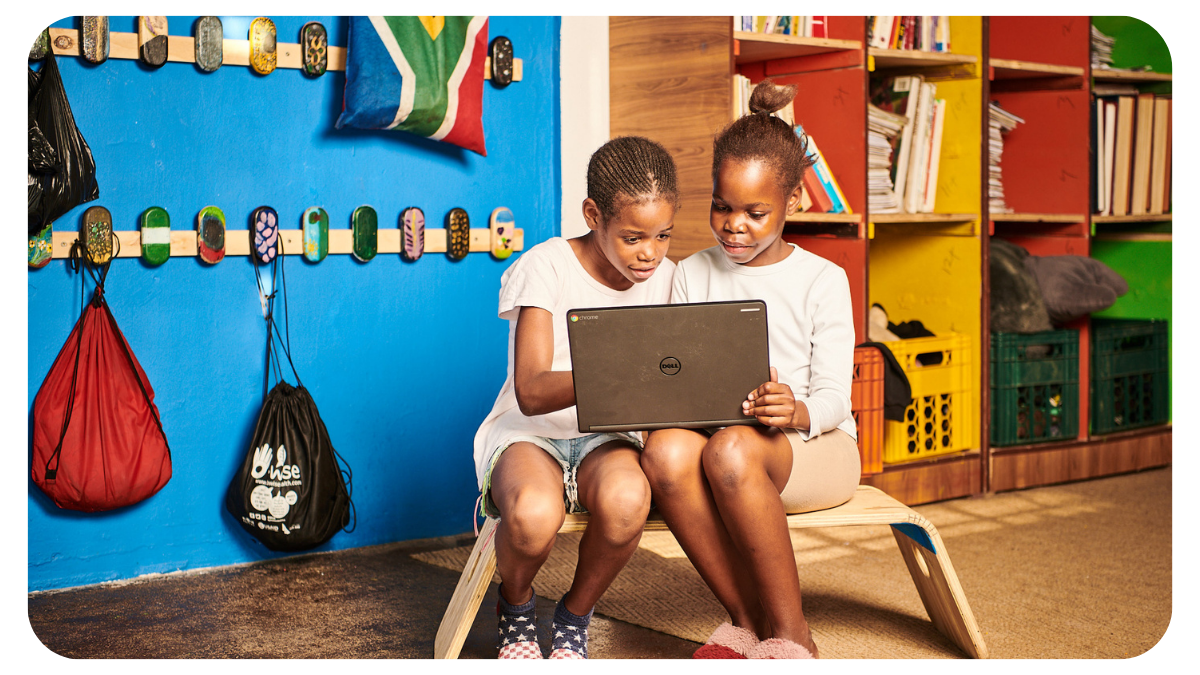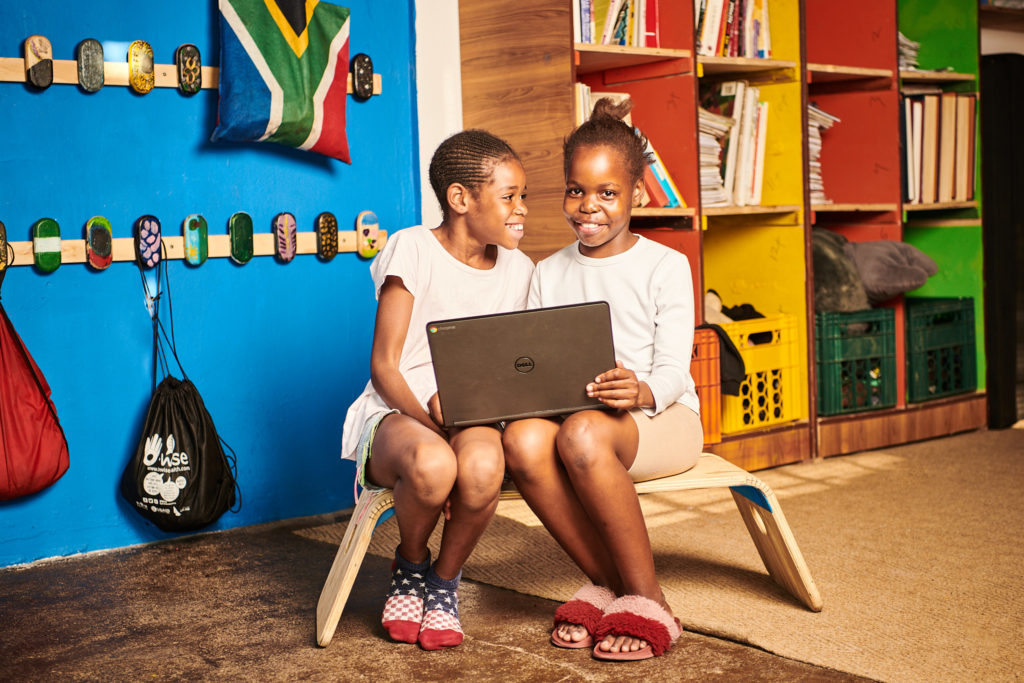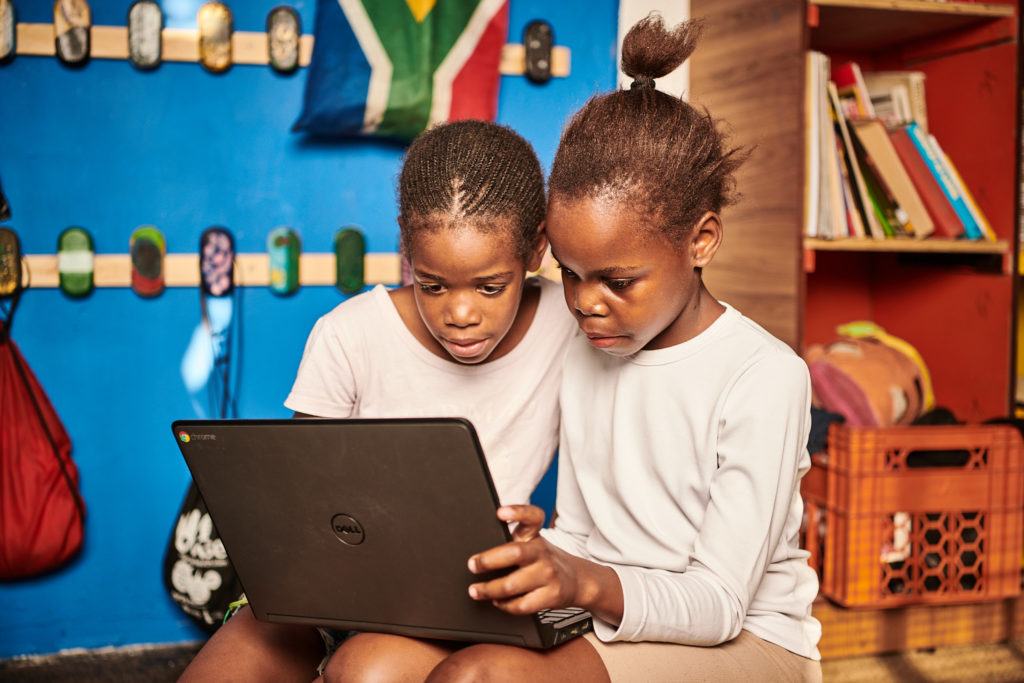
Melissa and Sizanenhle, both aged 10, attend the aftercare sessions at Timbuktu in the Valley, a skills development project in Johannesburg. All images by Thom Pierce.
Sizanenhle wants to be a scientist when she grows up. Or a lawyer, maybe. She hasn’t decided yet, but knows that both options will involve “lots of homework” between now and then. Melissa also wants to be a scientist, but her passion is dinosaurs, and while she can’t remember what the word is for a “dinosaur scientist” or even commit to a favourite dinosaur (“they’re all my favourites”), she can tell you where exactly to find out about them so you can choose a favourite for yourself.
When they aren’t planning their future careers, the two girls are working on their business idea — making and selling body lotions and other natural beauty products — and researching ingredients and packaging materials. Sizanenhle has saved page after page of recipes and information on the computer she uses at Timbuktu in the Valley, the skills development space where the girls meet in the afternoons when they return from their separate schools. They plan to sell their products at local markets, or even on the web itself. Melissa gives an overview of what they’ve found in their research. “You can make it cheaply, or more expensive, but then you have to have people to buy it. You need a good name for your business. You need to work hard”.

Their confidence, and independence, in using the web to access information is remarkable when one considers their context. In South Africa, where 50% of the population has basic internet access, only 13% of people are meaningfully connected and are able to use the web regularly and reliably. Little girls in low-income communities are rarely represented in that figure.
Christinah, a facilitator at the school, has seen the difference that regular internet access can make in the lives of young people who, through frequent exposure, become comfortable and capable= using the web to pursue opportunities and interests. “There seems to be a belief that kids from certain backgrounds lack curiosity, or intention. But that’s not the case at all. For some kids, their backgrounds are full of deprivation. They have curiosity, but nowhere to put it. The internet becomes an outlet for that, and they can be independent too, which matters when there is no one at home to guide this. The independence is so important”.
This agency and self-sufficiency needs to be supported with regular internet use, not ad hoc access which is so often all that children in these environments can expect, relying on public internet cafes or shared devices at best.
“You see this brightness, where the children are starting to realise what possibilities are, and how there are things out there that can enrich them, expand their world a bit. But then you see the sadness that comes in when they realise they don’t have this at home, the anxiety that they will lose what they have gained. It’s like a door opens for them and is shut again. They know they are missing out. They lose motivation”.
Sizanenhle and Melissa are not the only children at Timbuktu in the Valley who offer a glimpse into what possibilities are created when children, regardless of their backgrounds, are given access to the tools they need to empower themselves.
“There is another girl, Pearl, who discovered ballet on YouTube. She is teaching herself. She is so focused on progress. She will say ‘can I borrow your phone?’ and then sit and watch videos about techniques. And because of this curiosity, combined with access to the internet, she is now coming to me with the phone number of someone who can teach her, with lists of schools”.

It is quite difficult to get Sizanenhle and Melissa to speak about what the internet means to them, and what they would do if they could use it more often.They both want to continue working on their business idea, and say they are “almost ready” to start approaching weekend flea markets to get their own stall – or will try sell their products online, like they’ve seen on Instagram and YouTube. Melissa, of course, says she would use the internet to research even more about dinosaurs, and Sizanenhle would maybe find homework a bit easier if she had more time to do it, no longer restricted to using devices at the centre. These girls are far less interested in the internet as a distinct platform than they are the world of knowledge they access through it, and they would far rather talk about beauty, ghost stories, history, fashion, art or cartoons. Or dinosaurs.
Christinah sums it up. “If you don’t know something, you just keep quiet. And then, like these girls, you realise you know things. You have things to talk about. You have things to say. And that builds confidence. That’s what they find online”.
Have a look at our latest data on meaningful connectivity, and read more about the power of meaningful connectivity here.
Leave a Reply
